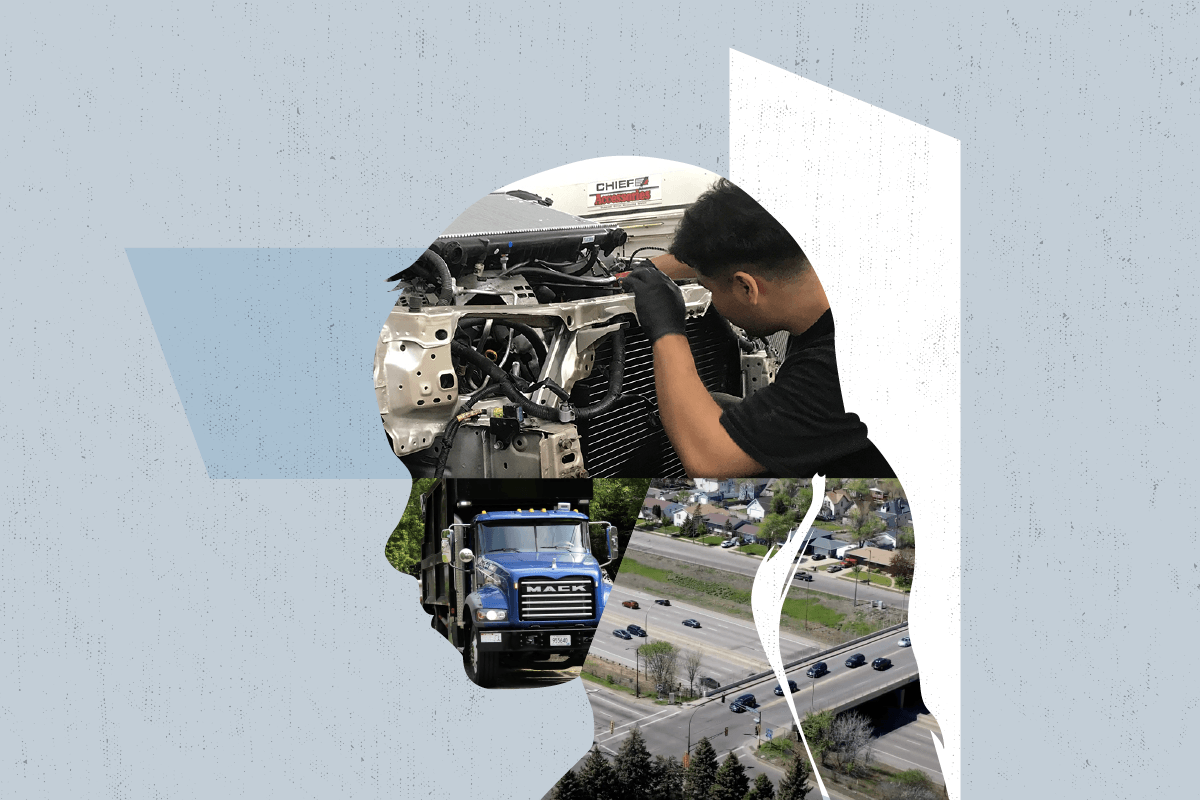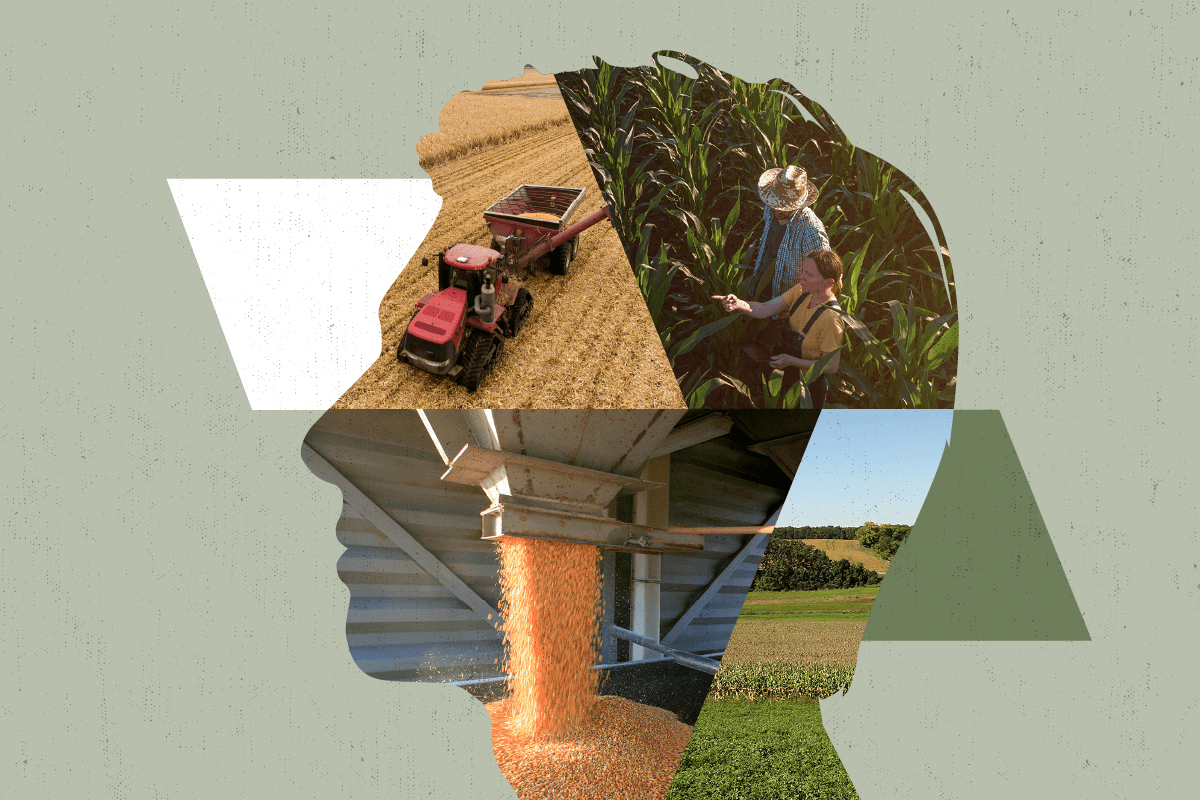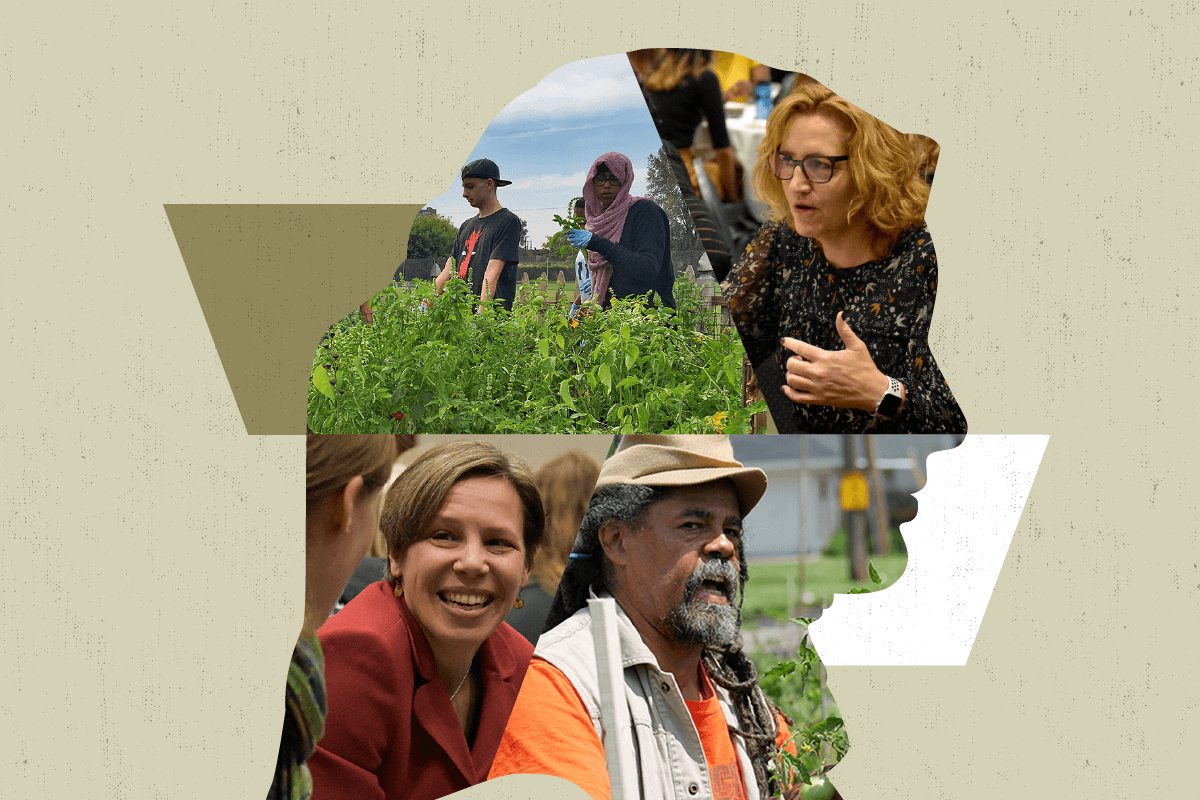2020 Annual Report
Letter from Ellen Gibson
In so many ways 2020 was a year none of us could easily imagine. For Environmental Initiative, our work over the past year has laid the foundation for ongoing transformation and evolution. I returned to Environmental Initiative six years ago with a personal mission of helping to usher in a long-range strategic plan. This dream of mine came true through close collaboration with our board of directors, staff, and talented consultant team during 2020. With a fresh set of identity statements and a bold direction to shape our work over the coming five years, we quickly got to work applying our renewed mission, vision and values.
As much as I genuinely enjoy the process of strategic planning, having a completed plan in place that is propelling our growth and development feels even better than I could have imagined! As we pivoted our programming and operations to prioritize the health and safety of our community, especially those who are most vulnerable, we explored innovative approaches to foster relationships and design inclusive conversations through virtual engagement. Our focus remained on catalyzing collaboration and bridging across difference in perspectives, power, and systems as we have done for nearly thirty years. With our new strategic plan in place, we honed a focused set of priorities that remain relevant and continue to inform our decisions:
- Integrate justice, equity, diversity, and inclusion throughout our work.
- Practice ongoing adaptation.
- Manage financial resources responsibly.
- Communicate effectively about our work and the organization.
We’re practicing applying these priorities to our personal development, in the relationships we’re building and deepening, as we make intentional shifts in our organizational culture and experiment with new ways of working, and throughout our programming. You’ll read highlights from our varied collaborations throughout this report. Our accomplishments would not be possible without the generosity of our supporters and partners: the people who share their time, ideas, passion, and financial resources with us fuel our faith in our vision for a future where relationships foster an inclusive, just, and thriving world for all beings.
I invite you to reach out if you have questions or want to get involved in our work.
In partnership,
Ellen Gibson
Introduction
Environmental Initiative works with business, nonprofit, government and community leaders across power and perspectives to address complex and systemic issues. Our team:
- Facilitates conversations addressing environmental, economic, and public health issues between diverse stakeholders as we work toward social equity and environmental health.
- Develops and implements on-the-ground projects to improve our air, land, and water for all beings.
- Plans and host events for environmental leaders to share information, network, and learn from one another.
Environmental Initiative is a leader in identifying need for and convening to activate policy and systems change. After recognizing the need to confront the organization’s mainstream, White-dominant culture and approach to environmental work, the staff, board, and sponsors launched a journey of intentional dismantlement of existing frames. Environmental Initiative is working within our theory of change framework and across difference to facilitate openness to address environmental, economic, and public health issues between diverse stakeholders and work toward social equity and environmental health for all. How we work changed in the global pandemic and the year of civil unrest. Through Zoom, Teams, email, instant messaging, and phone calls the constant was our focus on achieving goals, developing new partnerships, and launching new initiatives.
Administration and Operations
In September our new Finance Director, Bill Lemieux, joined the organization. He brings with him fresh perspectives and a strong non-profit background which leans into the focused priority to manage resources wisely. Deborah Carter McCoy, Gillian Greenberg, Camille Morse Nicholson, Alli Mueller, and Christina Vang-Dixon were also new to Environmental Initiative in 2020.
Early in the year the organization applied for and was granted a Paycheck Protection Program (PPP) loan from the Small Business Administration. This loan was forgiven by the Small Business Administration in early 2021.
The new strategic plan and organizational goals were adopted in the fall and implementation immediately began.
Air Quality

Clean Air Minnesota is a diverse coalition of air quality leaders convened by Environmental Initiative working together to reduce emissions from mobile sources, small businesses, and wood smoke. Partners form teams that coordinate, collaborate, and develop specific projects to reduce emissions from Minnesota’s smaller, widespread and less regulated sources of air pollution which contribute nearly 75 percent of air pollution emissions in the state.
Clean Air Minnesota hosted several webinars which included community outreach benefits, partnership accomplishments, and business pollution prevention program partnerships.
Project CAR repaired the emissions systems in 116 vehicles, reducing over six tons of emissions. Cars for Neighbors, Newgate School, and Nghia’s Auto Service joined The Lift Garage and Leech Lake Small Vehicle Garage as repair partners. The program held a virtual launch which included a video featuring The Lift Garage and media coverage in the Star Tribune and North Metro TV.
In partnership with Ramsey County and Ramsey/Washington Recycling & Energy Board, we launched the Business Pollution Prevention Program in spring 2020, offering financial support up to 75 percent of project costs up to $50,000. Despite the pandemic, we assisted three businesses through the grant process and helped them get approved for upgrades to their equipment and processes which resulted in improved air quality.
In December 2020, Project Green Fleet successfully completed all work in Diesel Emissions Reduction Act (DERA) grant 2332; the grant was awarded in January 2018. The project successfully repowered one marine towboat and replaced 10 on-road heavy-duty diesel vehicles, including six Class 8 trucks, one backhoe, two aerial lifts, and one street sweeper.
The towboat Itasca is owned by Upper River Services, LLC. Upper River Services operates in the heart of an ACP50 area – an area of concentrated poverty where 50 percent or more of residents are people of color – and provides inland marine transportation, barge towing, and fleeting services, primarily consisting of dry bulk materials.
The 10 on-road vehicles are part of the City of Saint Paul’s Public Works Department fleet, used for regular maintenance of city infrastructure and public projects, such as street sweeping and transport of bulk materials. This fleet operates in one of the highest density metropolitan areas in Minnesota. The project resulted in the lifetime reductions of approximately 18 tons of nitrogen oxides (NOx), 9 tons of particulate matter (PM), 4 tons of hydrocarbons (HC), and 24 tons of carbon monoxide (CO). Additionally, an article highlighting Project Green Fleet’s work with Upper River Services, including the repower of the towboat Itasca, appeared in the Waterways Journal Weekly. The Star Tribune also reported on the project.
Agriculture

Administered by Environmental Initiative, the Midwest Row Crop Collaborative (MRCC) explores and implements new approaches to agricultural challenges. The collaborative’s members work together to find solutions that increase productivity while ensuring soil health, protecting water, addressing the factors contributing to climate change, and supporting farm families in the upper Mississippi River Basin.
In 2020 the members adopted a new theory of change that demonstrates how MRCC’s collaborative projects advance systems change. Our first progress report highlights the implementation of sustainable agriculture practices on over a quarter-million acres since the collaboration’s inception.
MRCC continued to drive collaborative, on-the-ground projects focused on the adoption of sustainable practices (e.g., cover crops, tillage practices, and edge-of-field improvements) and their associated benefits for soil health, climate, water quality, biodiversity, and farm resilience and economics.
Cultivating learning among member companies and NGOs on topics including the business case for soil health, financing resilient agriculture, social barriers to sustainable practice adoption, and biodiversity strategies continued throughout the year. The MRCC team facilitated and hosted discussion on soil health and sustainable agriculture, including panels at VERGE Food on Purpose-Driven Branding for Sustainable Agriculture and the Sustainable Agriculture Summit on Lessons Learned from Collaboration with Kellogg, PepsiCo, The Nature Conservancy, Unilever, and Walmart.
A new website and video were unveiled to enhance how MRCC’s work is communicated, and re-activated communications through social media, newsletters, and regularly published articles.
An active work group committed to addressing policy barriers to sustainable agriculture was formed. The group defined policy principles for shared work, hosted expert speakers from leading policy organizations, and began to identify opportunities for engagement, (e.g., voicing support for the Growing Climate Solutions Act).
Headwaters Agricultural Sustainability Partnership is a unique collaboration of private, non-profit, and public sector leaders in Central Minnesota who are accelerating the development and implementation of farmer-led solutions that benefit the environment, economic viability of farmers, and vitality of rural communities. Convened by Environmental Initiative, the partnership offers innovations to accelerate continuous improvements in our environment, particularly for water quality, soil health, habitat, and climate protection. The partnership formalized its structure in 2020 after working together since 2018.
Three partner-led projects are underway:
- All Acres for our Waters brings together public and private technical expertise, agronomic intelligence, and financial resources to enhance and restore natural resources in Stearns County. In 2020, the program released a series of information videos on conservation practices, connected with regional agriculture retailers, and surveyed landowners on the barriers to conservation practice adoption.
- Ecosystem Services Market Consortium (ESMC) Pilot project will test the protocols and data processes of ESMC, a program to provide financial incentives to encourage farmers to implement practices that improve soil health, store carbon in soils, and reduce nutrient runoff. In 2020, the team enrolled its first five farms in the pilot and collected soil samples.
- Return on Investment Case Study Project continues to work with integrated row crop and dairy operations in Stearns County to analyze the relationship between on-farm conservation and finances. The first three farmers in the project completed their second year of data collection and began preparing for peer-to-peer outreach.
Events

The Environmental Initiative Awards is our annual recognition program celebrating people and projects working in partnership at the nexus of a healthy environment, a prosperous economy, and an equitable society. We bring together partners from across the environmental community and our organizational work to honor award recipients during an inspiring event of celebration and networking. We launched the Awards website in response to the global pandemic and canceled our flagship in-person event. We recognized the winners through video interviews, blog posts, and social media throughout the summer and fall.
Our Policy Forum Series also took a virtual turn. Three events were held as we shifted to offering a pre-event audiocast, reading materials, and discussion questions to support the webinars. The topics of transportation, food systems, and the local economy were addressed within the frame of pandemic impacts, equity, and environmental health outcomes.
Webinars on community engagement for clean air, the business case for circularity, and energy/GHG reporting were also presented in 2020. Our annual legislative preview was hosted in January.
Sustainability, Equity, and Circularity

Nearly 30 businesses and organizations form the Sustainable Growth Coalition, a business-led partnership administered by Environmental Initiative harnessing member expertise to advance the next frontier of corporate sustainability — the circular economy. Determining projects that move toward a circular economy, the Coalition members evaluate options through stakeholder, environmental, economic, social wellness, and life-cycle lenses. Collaborative projects advance clean energy, convert organic waste into valuable resources, and protect or restore the natural water cycle with an ever-growing equity framework.
The Coalition launched its first C-Suite event with 25 executives attending. The event was held in partnership with GREATER MSP to explore the intersection of circularity and equity. Another successful event with over 90 attendees was held with key legislators and members at a legislative breakfast designed to showcase the business case for circularity and sustainability.
Testifying during a Minnesota House Committee session, Coalition leaders from 3M, Aveda, the University of Minnesota, and Xcel Energy shared the business case for corporate circularity and sustainability initiatives. Member expertise was highlighted in our case study on Utility/Customer Collaboration on Uniform Greenhouse Gas and Renewable Energy Reporting, along with a public webinar to share the value of and how to better an organization’s greenhouse gas and renewable energy reporting.
The Circularity Toolkit launch with member case studies demonstrating different ways to create systems change across different business models was a big success. A corresponding webinar offered additional resources for attendees.
Continuing to develop a shared understanding of the important work of circularity and equity, guest speakers joined membership meetings, small group discussions, and members-only social hours.
Water Quality

In February, information gathering to better understand what a statewide Source Water Protection Collaborative could provide at the local level was complete. The report and a summary from this first phase are available. We held one-on-one conversations to understand people’s ability to participate during the global pandemic, to listen to individual needs and seek input—to understand each person’s capacity in order to find a mutually supportive and beneficial role.
In mid-2020, we convened an initial group of the Minnesota Source Water Protection Collaborative. Late in the year, the vision and purpose statements were complete.
Vision: We make choices on the land that ensure clean, safe drinking water for all
Purpose: Bringing together diverse groups and perspectives to advance collective action for protecting drinking water
We began forming workgroups around:
- Developing and compiling resources to make the protection of drinking water sources accessible, engaging, and grounded in local and cultural values.
- Supporting peer-to-peer learning for land use, public health, and drinking water professionals.
- Network building among stakeholders in the drinking water sector to strengthen relationships and understanding across perspectives.
- Building an incubation hub where different people and groups can connect to develop on-the-ground projects to protect drinking water sources.
Heading into 2020 in Cedar River Watershed Partnership we planned new methods of engagement with farmers, including networking events among certified farmers, water-quality certified farmers, and other interested farmers. The pandemic put a hold on these in-person events. As most partners typically work one-on-one with farmers, they worked to balance phone and video calls with in-person meetings when absolutely necessary. The partnership has continued support from Mower Soil & Water Conservation District.
Pheasants Forever recognized Mower County farmer, Tom Cotter, for wildlife endorsement through Minnesota Agriculture Water Quality Certification Program (MAWQCP). Several news articles focused on certified farmers and the Partnership:
- Collaboration Drives Water Stewardship Forward in the Food Sector
- Ag certainty program gets local incentive
- CRWP adds local incentive to ag certainty program
We determined some metrics to use for measuring progress in outreach and practice changes within the Cedar River Watershed Partnership. Goals included:
- Certifying 6,000 acres in the Minnesota Agriculture Water Quality Certification Program (MAWQCP).
- Certify at least five producers.
- Complete 30 conservation walkovers with farmers.
While we didn’t meet these goals for 2020, we continue to build strong relationships as partners and a network.
Financials
Copies of Environmental Initiative’s Form 1023 and audited financial statements are available upon request.
Thank You!
We offer a big thank you to our partners and financial supporters who helped make this work happen in a year like no other. In a year when giving was more challenging due to financial uncertainty, when a once-in-a-century virus changed us in unpredictable ways, and when the eyes of the world were on the epicenter of civil unrest right in our backyard, you were there for us.
Our relationship-based work is possible with your trust in us. We acknowledge this gift as we continue working toward a future that holds an inclusive, just, and thriving world for all beings.